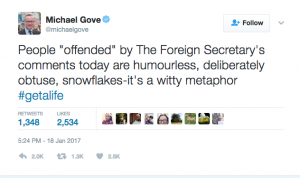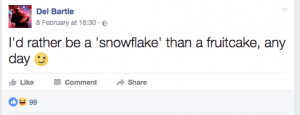Word of the day: snowflake
London had its first real sprinkling of snow last weekend. It wasn’t that exciting, to be honest: a couple of inches fell on Friday night, which is nothing compared to the kind of snow I’m sure many of you get every year, but it was enough to bring the city to a standstill. As always happens every year, flights out of Gatwick and Heathrow were cancelled, commuters trying to get home went into panic mode and social media was full of typically dry jokes and hashtags like #prayforLondon! However, much as I love a bit of snow, this isn’t what I’m here today to talk about. Instead, it’s a new use of the word snowflake that has been trending over recent months.
I think I first became aware of the use of snowflake as an insult when a Conservative politician called Michael Gove, who’s perhaps best known for his disastrous time as Secretary of State for Education, used it in a response to the wave of outrage that had greeted our Foreign Secretary Boris Johnson’s so-called ‘joke’ comparing the French President François Hollande to a Nazi prison guard (despite the fact the French were occupied by the Nazis during the war and that Johnson would soon be having to sit down and negotiate Britain’s exit from the European Union with Monsieur Hollande, among others!). Gove smelled blood and tweeted that anyone ‘offended’ (yes, he really did use scare quotes around that word – to suggest that people weren’t really offended; they were just pretending to be!) by these comments was “humourless” (one of the worst things you can ever accuse anyone here of!) and was also clearly a snowflake! The implication was that they’re delicate and fragile, and, of course, by using the term snowflake, he was also trying to not only shut down their opinions, but to insult them for being offended that he was trying to do so! It was a classic example of how nasty much debate on social media has become . . . and how intolerant of other opinions many of those in the public eye have become as well.

Steve Bannon, who is now Donald Trump’s chief strategist, has been throwing the term snowflake around very liberally over recent months as well, using it against any journalists, celebrities and young people who objected to Trump’s inflammatory rhetoric. Interestingly, much of the recent use of the word has been directed at the young and the more liberal / left-wing by older, more right-wing people. The suggestion is always that the young and those on the left are easily offended, too thin-skinned, too sensitive. They need to man up and face up to the harsh realities of the world, the old guard keep telling them. However, more recently, the left has attempted to claim the word and Trump himself is often accused of being a snowflake – very quick to take offence and unable to handle dissent or differing points of view.
So we now have a situation where the left are calling the right snowflakes whenever they express offence, the right are calling the left snowflakes for being too liberal, the old are calling the young snowflakes for being too sensitive, and the young are pointing out that the older generation seem to be far more easily offended than they are! The real winner here, of course, is the word itself. There’s no obvious response to it – and, of course, if you do get offended by someone calling you a snowflake, then you’re simply proving that they were right about you all along!
Perhaps the best comeback to the insult that I’ve seen is the Facebook post below:

A fruitcake is an informal word for someone you think is basically mad. And, of course, flake and cake rhyme, which is nice.
Want to learn more with Lexical Lab? Take one of our online courses.
- Do politicians in your country use social media much? Is it reported on? How do you feel about it?
- What kinds of things do you usually get offended by?
- Do you ever get involved in debate on social media? Why? / Why not?
- How would you respond if someone called you a snowflake?
Leave a Reply